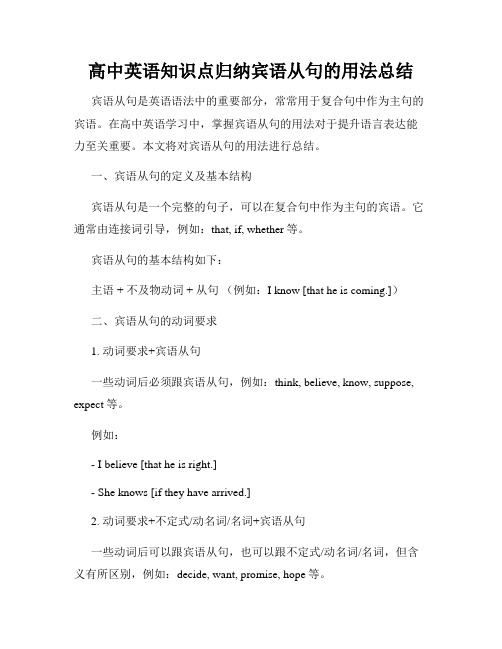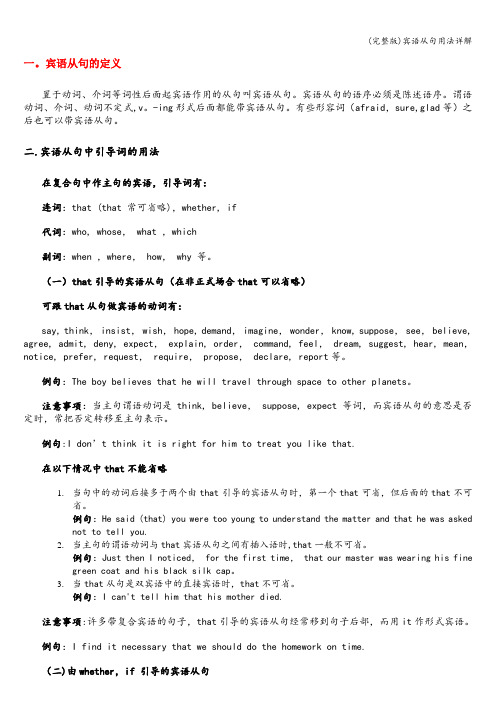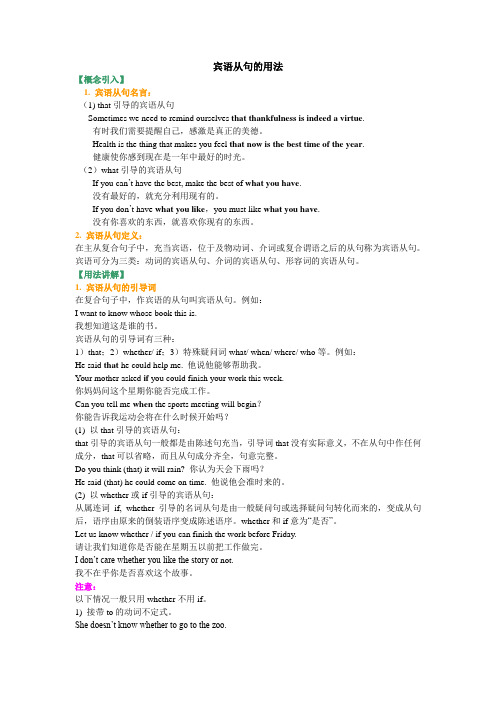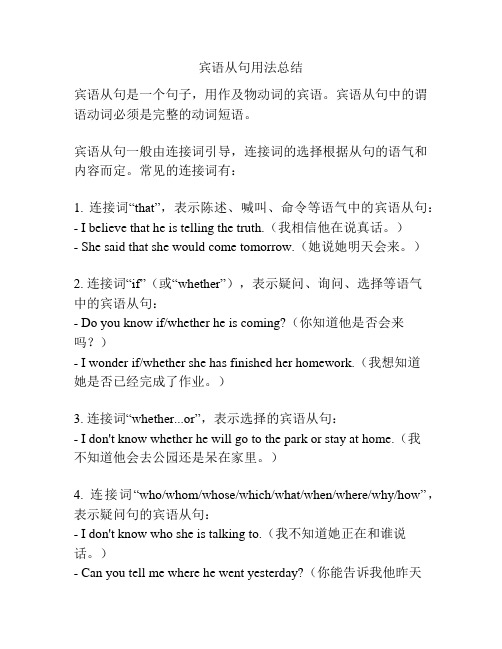高中英语宾语从句的常用用法归纳(详)
高中英语宾语从句知识点总结

高中英语宾语从句知识点总结宾语从句就是在复合句中作宾语的名词性从句,通常放在主句谓语动词 (及物动词) 或介词之后。
1. 作动词的宾语(1) 由that引导的宾语从句(that通常可以省略), 例如:I heard that be joined the army. 我听说他参军了。
(2) 由what, whether (if) 引导的宾语从句,例如:a) She did not know what had happened.她不知道发生了什么。
b) I wonder whether you can change this note for me. 我想知道你是否能帮我改一下笔记。
(3) 动词+间接宾语+宾语从句。
例如:She told me that she would accept my invitation. 她对我说她会接受我的邀请。
2. 作介词的宾语,例如:Our success depends upon how well we can cooperate with one another. 我们的成功取决于我们之间的合作。
3. 作形容词的宾语,例如:I am afraid (that) I’ve made a mistake.我恐怕我已经犯了一个错误。
注意:that 引导的从句常跟在下列形容词后作宾语:anxious, aware,certain, confident, convinced, determined, glad, proud, surprised, worried,sorry, thankful, ashamed, disappointed, annoyed, pleased, hurt, satisfied,content 等。
也可以将此类词后的that 从句的看作原因状语从句。
4. it 可以作为形式宾语it 不仅可以作为形式主语,还可以作为形式宾语而真正的宾语that 从句则放在句尾,特别是在带复合宾语的句子中。
高中英语知识点归纳宾语从句的用法总结

高中英语知识点归纳宾语从句的用法总结宾语从句是英语语法中的重要部分,常常用于复合句中作为主句的宾语。
在高中英语学习中,掌握宾语从句的用法对于提升语言表达能力至关重要。
本文将对宾语从句的用法进行总结。
一、宾语从句的定义及基本结构宾语从句是一个完整的句子,可以在复合句中作为主句的宾语。
它通常由连接词引导,例如:that, if, whether等。
宾语从句的基本结构如下:主语 + 不及物动词 + 从句(例如:I know [that he is coming.])二、宾语从句的动词要求1. 动词要求+宾语从句一些动词后必须跟宾语从句,例如:think, believe, know, suppose, expect等。
例如:- I believe [that he is right.]- She knows [if they have arrived.]2. 动词要求+不定式/动名词/名词+宾语从句一些动词后可以跟宾语从句,也可以跟不定式/动名词/名词,但含义有所区别,例如:decide, want, promise, hope等。
- He decided [to go] home.- We decided [that we would go] home.三、宾语从句的连接词1. 连接词thatthat是最常用的宾语从句引导词,通常可以省略。
一般在口语中,特别是在陈述句中,that经常省略,而在疑问句和感叹句中则不省略。
例如:- I know [that she is busy.] (that可以省略)- Do you know [if she is busy?] (不能省略)2. 连接词if/whetherif和whether都可以引导宾语从句,表示“是否”,常用于宾语从句中的疑问句。
例如:- She asked [whether he would come] or not.- I wonder [if it will rain] tomorrow.3. 连接词连接宾语从句中的时间、地点等状语一些连接词可以引导宾语从句,表示时间、地点等状语关系,例如:when, where, why等。
(完整版)宾语从句用法详解

一。
宾语从句的定义置于动词、介词等词性后面起宾语作用的从句叫宾语从句。
宾语从句的语序必须是陈述语序。
谓语动词、介词、动词不定式,v。
-ing形式后面都能带宾语从句。
有些形容词(afraid,sure,glad等)之后也可以带宾语从句。
二.宾语从句中引导词的用法在复合句中作主句的宾语,引导词有:连词:that (that 常可省略),whether, if代词:who, whose, what ,which副词:when ,where, how, why 等。
(一)that引导的宾语从句(在非正式场合that可以省略)可跟that从句做宾语的动词有:say, think, insist, wish, hope, demand, imagine, wonder, know, suppose, see, believe, agree, admit, deny, expect, explain, order, command, feel, dream, suggest, hear, mean,notice, prefer, request, require, propose, declare, report等。
例句:The boy believes that he will travel through space to other planets。
注意事项:当主句谓语动词是 think, believe, suppose, expect 等词,而宾语从句的意思是否定时,常把否定转移至主句表示。
例句:I don’t think it is right for him to treat you like that.在以下情况中that不能省略1.当句中的动词后接多于两个由that引导的宾语从句时,第一个that可省,但后面的that不可省。
例句:He said (that) you were too young to understand the matter and that he was askednot to tell you.2.当主句的谓语动词与that宾语从句之间有插入语时,that一般不可省。
宾语从句的用法(基础讲解)

宾语从句的用法【概念引入】1. 宾语从句名言:(1) that引导的宾语从句Sometimes we need to remind ourselves that thankfulness is indeed a virtue.有时我们需要提醒自己,感激是真正的美德。
Health is the thing that makes you feel that now is the best time of the year.健康使你感到现在是一年中最好的时光。
(2)what引导的宾语从句If you can’t have the best, make the best of what you have.没有最好的,就充分利用现有的。
If you don’t have what you like,you must like what you have.没有你喜欢的东西,就喜欢你现有的东西。
2. 宾语从句定义:在主从复合句子中,充当宾语,位于及物动词、介词或复合谓语之后的从句称为宾语从句。
宾语可分为三类:动词的宾语从句、介词的宾语从句、形容词的宾语从句。
【用法讲解】1. 宾语从句的引导词在复合句子中,作宾语的从句叫宾语从句。
例如:I want to know whose book this is.我想知道这是谁的书。
宾语从句的引导词有三种:1)that;2)whether/ if;3)特殊疑问词what/ when/ where/ who等。
例如:He said that he could help me. 他说他能够帮助我。
Your mother asked if you could finish your work this week.你妈妈问这个星期你能否完成工作。
Can you tell me when the sports meeting will begin?你能告诉我运动会将在什么时候开始吗?(1) 以that引导的宾语从句:that引导的宾语从句一般都是由陈述句充当,引导词that没有实际意义,不在从句中作任何成分,that可以省略,而且从句成分齐全,句意完整。
三大宾语从句的用法及例句

三大宾语从句的用法及例句宾语从句是一个句子,它作为一个名词的宾语出现在一个句子中。
根据其引导词的不同,宾语从句可以分为三种类型:宾语从句、宾语从句和强调宾语从句。
下面将分别介绍这三种宾语从句的用法和例句。
一、宾语从句宾语从句由连词"that"引导,用于表示一种说法、信念、指示或意图。
宾语从句通常出现在及物动词(例如think, believe, hope, know等)、及物介词后,并且在主句中充当宾语的成分。
1.1 用法当宾语从句表达的观点或说法与主句的动词表示的意义相符时,宾语从句的时态通常与主句相同。
而当宾语从句表达的观点或说法与主句的动词表示的意义不相符时,宾语从句的时态通常要根据实际情况进行变化。
1.2 例句1) He said (that) he would come to the party.(他说他会参加派对。
)2) She believes (that) he is a good student.(她相信他是个好学生。
)3) I hope (that) you are doing well.(我希望你一切都好。
)二、宾语从句宾语从句由关联词"whether"或"if"引导,用于表示选择、询问、疑惑或愿望等情况。
宾语从句通常出现在及物动词、介词、形容词或名词后。
2.1 用法当宾语从句表达选择、询问、疑惑或愿望等情况时,通常用"whether"或"if"引导宾语从句。
"whether"用于表达选择和疑惑,"if"用于表达询问和愿望。
2.2 例句1) I wonder whether he will come.(我想知道他是否会来。
)2) She asked if it was going to rain.(她问天气是否会下雨。
)3) They don't know whether to go or stay.(他们不知道是去还是留。
宾语从句用法总结

宾语从句用法总结
宾语从句是一个句子,作为主句的宾语。
宾语从句一般由连词引导,可以出现在及物动词、介词、形容词等的宾语位置。
宾语从句的引导词通常有以下几种:
1.连词:that, whether(是否)
2.疑问词:what, where, when, why, how等
例如:I don't know what she wants.
3.不定式:to do
例如:He wants to know what to do next.
宾语从句常常有以下几种结构:
1.陈述句结构:
主语+谓语+宾语从句
例如:I know (that) he is a student.
2.一般疑问句结构:
连词+主语+谓语其他
例如:Do you know if/whether he is a student?
3.特殊疑问句结构:
特殊疑问词+主语+谓语其他
例如:Can you tell me what he is doing?
需要注意的是,在宾语从句中,谓语动词的形式往往要根据主句的语
气和时态来确定。
如果主句是陈述句,宾语从句的谓语动词一般保持原形;如果主句是一般疑问句,宾语从句的谓语动词一般用陈述句的语序;如果
主句是特殊疑问句,宾语从句的谓语动词要根据特殊疑问词进行调整。
总之,宾语从句是一种常用的句子结构,用于表示主句的宾语,并由
连词引导。
在使用宾语从句时,需要注意连词的选择、陈述句和疑问句的
语序以及谓语动词的形式。
宾语从句用法总结

宾语从句用法总结宾语从句是一个句子,用作及物动词的宾语。
宾语从句中的谓语动词必须是完整的动词短语。
宾语从句一般由连接词引导,连接词的选择根据从句的语气和内容而定。
常见的连接词有:1. 连接词“that”,表示陈述、喊叫、命令等语气中的宾语从句:- I believe that he is telling the truth.(我相信他在说真话。
)- She said that she would come tomorrow.(她说她明天会来。
)2. 连接词“if”(或“whether”),表示疑问、询问、选择等语气中的宾语从句:- Do you know if/whether he is coming?(你知道他是否会来吗?)- I wonder if/whether she has finished her homework.(我想知道她是否已经完成了作业。
)3. 连接词“whether...or”,表示选择的宾语从句:- I don't know whether he will go to the park or stay at home.(我不知道他会去公园还是呆在家里。
)4. 连接词“who/whom/whose/which/what/when/where/why/how”,表示疑问句的宾语从句:- I don't know who she is talking to.(我不知道她正在和谁说话。
)- Can you tell me where he went yesterday?(你能告诉我他昨天去了哪里吗?)需要注意的是,宾语从句中的人称和时态要根据宾语从句所在的主句来确定,且从句中的主语必须是与主句的主语一致的人或物,从句中的时态一般要比主句的时态滞后一般时态。
例如:- She said she would come tomorrow.(她说她明天会来。
)- I don't know where he went yesterday.(我不知道他昨天去了哪里。
(完整版)宾语从句用法详解

宾语从句用法及其例句宾语从句,是名词性从句的一种。
在主从复合句中充当宾语,位于及物动词、介词或复合谓语之后的从句称为宾语从句。
宾语从句分为三类:动词的宾语从句,介词的宾语从句和形容词的宾语从句。
宾语从句用法时态:1.主句用一般现在时,从句可用任意时态。
2.主句用过去时,从句用过去某个时态。
3.主句用过去时,从句是客观真理时,只用一般现在时。
一、宾语从句的连接词(1)从属连词连接宾语从句的从属连词主要有that,if,whether.that引导表示陈述句的宾语从句,if和whether引导表示“是否”的一般疑问句的宾语从句.He told me (that he would) go to the college the next year他告诉我他明年上大学.I don’t know if there will be a bus any more.我不知道是否还会有公交车.Nobody knew whether he could pass the exam.没人知道他是否会通过考试.(2)连接代词连接代词主要有who, whom ,whose ,what ,whoever ,whomever ,whosever, whatever, whichever等.连接代词一般指疑问,但what, whatever除了指疑问外,也可以指陈述.Do you know who has won Red Alert game?你知道是谁赢得了红色警报的游戏?The book will show you what the best CEOs should know.这本书会告诉你最好的执行总裁该了解些什么.Have you determined whichever you should buy,a Motorola or Nokiacell phone?你决定好是买诺基亚还是摩托罗拉的电话了吗?(3)连接副词连接副词主要有when,where,why,how,whenever,wherever,however等.He didn’t tell me when we should meet again.他没有告诉我什么时候我们能再见面.Could you please tell me how you use the new panel?你能告诉我怎么用这个新的操作盘吗?None of us knows where these new parts can be bought.没有人知道这些的新的零件能在哪里买到.动宾重点,介宾掌握,形宾了解二、动词的宾语从句(1)大多数动词都可以带宾语从句We all expect that they will win , for members of their team are stronger.我们都预料他们会赢,因为他们的队员更强壮.He told us that they would help us through the whole work.他告诉我们在整个工作中,他们都会帮忙的.(2)部分“动词+副词”结构也可以带宾语从句I have found out that all the tickets for the concert have been sold out.我发现这场音乐会的所有票都卖光了.Can you work out how much we will spend during the trip?你能计算出这次旅行我们将花费多少钱吗?(3)动词短语也可以带宾语从句常见的这些词有:make sure确保make up one’s mind下决心keep in mind牢记Make sure that there are no mistakes in your papers before youturn them in.在上交试卷前确保没有任何错误.可运用形式宾语it代替的宾语从句①动词find,feel,consider,make,believe等后面有宾语补足语的时候,则需要用it 做形式宾语而将that宾语从句后置.I think it necessary that we take plenty of hot water every day .我认为每天多喝开水是有必要的.I feel it a pity that I haven’t been to the get-together.我没去聚会,感觉非常遗憾.I have made it a rule that I keep diaries.我每天写日记成了习惯.We all find it important that we (should) make a quick decisionabout this mater.我们都认为对这件事马上做出决定很重要.②有些动词带宾语从句时需要在宾语与从句前加it这类动词主要有:hate, take , owe, have, see to.I hate it when they with their mouths full of food.我讨厌他们满嘴食物时说话.He will have it that our plan is really practical.他会认为我们的计划确实可行.We take it that you will agree with us.我们认为你会同意我们的.When you start the engine, you must see to it that car is inneutral.开启发动机时, 一定要使汽车的离合器处于空挡位置.③若宾语从句是wh-类,则不可用it代替We all consider what you said to be unbelievable.我们都认为你所说的是不可信的.We discovered what we had learned to be valuable.我们发现我们所学到的东西都是有用的.三、介词的宾语从句(1)用wh-类的介词宾语从句We are talking about whether we admit students into our club.我们正在讨论是否让学生加入我们的俱乐部.The new book is about how Shenzhou 6 manned spaceship wassent up into space.这本新书是关于神州6号载人航天飞船是如何升入太空的.(2)用that,if引导的介词宾语从句有时候except,but,besides三个介词后可见到that引导的宾语从句I know nothing about my new neighbor except that he used towork with a company.对于我的新邻居我只知道他曾在一家公司上班,其他一无所知.四、形容词的宾语从句有些形容词具有动词的含义,所以也可以带一个宾语从句,常用来引导宾语从句的形容词有: sure,certain,glad,please,happy,sorry,afraid,satisfied,surprisedI am sure I will pass the exam.我确信我会通过考试.I am sorry that I have troubled you so long.很抱歉我这么长时间在打扰你.He is glad that Li Ming went to see him when he was ill.他很高兴在他生病的时候李明能去看望他.五、if,whether在宾语从句中的区别①if和whether在作“是否”解时,引导宾语从句常放在动词know,ask,care,wond er,find out等之后,介词后一般不用if②少数动词,如:leave,put,discuss,doubt后的宾语从句常用whether.③whether后可以加or not,但是if不可以.④在不定式前只能用whether.(如:I can’t decide whether to stay. 我不能决定是否留下。
- 1、下载文档前请自行甄别文档内容的完整性,平台不提供额外的编辑、内容补充、找答案等附加服务。
- 2、"仅部分预览"的文档,不可在线预览部分如存在完整性等问题,可反馈申请退款(可完整预览的文档不适用该条件!)。
- 3、如文档侵犯您的权益,请联系客服反馈,我们会尽快为您处理(人工客服工作时间:9:00-18:30)。
英语宾语从句的常用用法归纳(详)
宾语从句,是名词性从句的一种。
在主从复合句中充当宾语,位于及物动词、介词或复合谓语之后的从句称为宾语从句。
1概念
假如一个句子作谓语动词的宾语的话,我们把这个宾语叫做宾语从句。
宾语从句的完整结构是“主句+引导词+从句”。
Eg: He said that he visit his teacher last year
2引导词
通常引导陈述句的引导词是“that”
引导一般疑问句的引导词是“if”和“whether”
引导特殊疑问句的引导词则是众多的特殊疑问代词或疑问副词, what who when 等。
Eg: He asked me if (whether) I was a teacher.
直接引语变成宾语从句
直接引语:直接引用别人说的话
间接引语:转达别人说的话
直接引语变成宾语从句,如果冒号,引号里是陈述句形式,要用“that”引导,同时从句中的人称,时态,指示代词,地点状语等都要发生相应的变化。
3人称的变化:遵循一主二宾三不变
"一主"是指在直接引语变间接引语时,如果从句中的主语是第一人称或被第一人称所修饰。
从句中的人称要按照主句中主语的人称变化。
如:She said. "My brother wants to go with me. "→She said her brother wanted to go withher.
"二宾"是指直接引语变间接引语时,若从句中的主语及宾语是第二人称。
或被第二人称所修饰。
从句中的人称要跟引号外的主句的宾语一致。
如果引号外的主句没有宾语。
也可以用第一人称。
如:He said to Kate. "How is your sister now?"→He asked Kate how her sister was then
"三不变"是指直接引语变间接引语时。
如果从句中的主语及宾语是第三人称或被第三人称所修饰,从句中的人称一般不需要变化。
如:Mr Smith said. "Jack is a good worker。
"→Mr Smith said Jack was a good worker
4时态变化(从句的时态向前倒一个时态)
一般现在时——一般过去时
一般过去时——现在完成时
现在进行时——过去进行时
一般将来时——过去将来时
现在完成时——过去完成时
过去完成时——过去完成时
Eg: She said. "I have lost a pen."
→She said she had lost a pen现在完成时——过去完成时
She said. "He will go to see his friend".
→She said he would go to see his friend一般将来时——过去将来时
但要注意在以下几种情况下。
在直接引语变为间接引语时,时态一般不变化。
1.直接引语是客观真理。
(地球围着太阳公转,月亮影响潮汐)
"The earth moves around the sun and the moon moves around the earth, the teacher told me.
→The teacher told me the earth moves around the sun and the moon moves around the earth。
2.直接引语是过去进行时,时态不变。
如:
Jack said. "John, where were you going when I met you in the street?"→Jack
asked John
where he was going when he met him in the street。
3.直接引语中有具体的过去某年、某月、某日作状语,变为间接引语时,时态不变。
如:
Xiao Wang said. "I was born on April 2l, 1980。
" →Xiao Wang said he was born on April 21,1980。
4.直接引语如果是一般现在时。
表示一种反复出现或习惯性的动作,变间接引语,时态不变。
如:
He said, "I get up at six every morning。
" →He said he gets up at six every morning。
5.如果直接引语中的情态动词没有过去时的形式(例:ought to,had better, used to)和已经是过去时的形式时,(例:could, should, would, might)不再变。
如:
Peter said. "You had better come here today。
" →Peter said I had better go there that day。
5状语变化
直接引语变间接引语,状语变化有其内在规律,时间状语由"现在"改为"原来"(例:now变为then,yesterday变为the day before,地点状语,尤其表示方向性的,或用指示代词修饰的状语,由"此"改为"彼"(例:this 改为that),
如:He said, "These books are mine." →He said those books were his this——that
these——those
now——then
today——that day
yesterday——the day before
yesterday morning——the morning before
the day before yesterday——two days before
tomorrow——the next/follow day
tomorrow evening——the next/follow evening
this week——that week
last week——the week before
here——there
come——go
bring——take
6变句型
1.直接引语如果是陈述句,间接引语应改为由that引导的宾语从句。
如:She said, "Our bus will
arrive in five minutes."→She said that their bus would arrive in five minutes.
2.直接引语如果是反意疑问句,选择疑问句或一般疑问句,间接引语应改为由whether或if引导的宾语从句.如:He said, "Can you swim, John?" →He asked John if he could swim.
"You have finished the homework, haven't you?" my mother asked. →My mother asked me whether I had finished the homework.
"Do you go to school by bus or by bike?" he asked.→He asked me if I went to school by busor by bike.
3.直接引语如果是特殊问句,间接引语应该改为由疑问代词或疑问副词引导的宾语从句(宾语从句必须用陈述句语序)。
She asked me, "When do they have their dinner?"→She asked me when they had their dinner.
Eg: I don't know whom you should depend on.
4.直接引语如果是祈使句,间接引语应改为"tell(ask, order, beg等) sb (not)
to do sth."句型。
如:"Don't make any noise," she said to the children. →She told (ordered) the children not tomake any noise. "
Bring me a cup of tea, please," she said.→She asked him to bring her a cup of tea.
5.直接引语如果是以"Let's"开头的祈使句,变为间接引语时,通常用"suggest "
如:He said, "Let's go to the film." →He suggested going to the film.
或: He suggested that they should go to see the film.。
